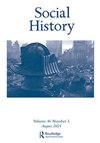不公正、去工业化和1984-1985年苏格兰矿工罢工
IF 1.1
1区 历史学
Q1 HISTORY
引用次数: 0
摘要
苏格兰煤炭生产的转型在20世纪60年代和70年代得到了谨慎的管理,优先考虑了劳动力的声音和公共安全。上世纪80年代,在玛格丽特•撒切尔(Margaret Thatcher)的保守党政府领导下,这种情况突然发生了变化。煤矿关闭和裁员加速;矿工和煤炭社区受到政治攻击。在1984-1985年反对煤矿关闭的罢工中,工会官员和活动人士在苏格兰受到的刑事定罪和迫害,比在英格兰和威尔士严重得多。罢工老兵的口述历史证词有力地说明了历史上的不公平,这种不公平是由敌对的反工会政府、国家煤炭局官员、警察和治安官强加的。然而,他们在警戒线上和社区中遭遇的不公正故事,使去工业化的口述历史倾向于悲观和失落。罢工老兵积极评价了这次罢工及其政治意义。他们的记忆构成了可用的过去,出现在随后的竞选活动中。苏格兰议会于2022年通过的《矿工罢工(赦免)法案》(Miners’Strike (pardon) Act)是一项重要成果,该法案规定,在1984年至1985年期间,因罢工而被定罪的人将获得集体和死后赦免。本文章由计算机程序翻译,如有差异,请以英文原文为准。
Injustice, deindustrialisation and the 1984–1985 Miners’ Strike in Scotland
ABSTRACT The transition out of coal production in Scotland was managed carefully in the 1960s and 1970s, prioritising workforce voice and communal security. Under Margaret Thatcher’s Conservative governments in the 1980s, the position changed abruptly. Colliery closures and redundancies accelerated; miners and coal communities were subject to political attack. The criminalisation and victimisation of union officials and activists during the 1984–1985 strike against pit closures was disproportionately greater in Scotland than in England and Wales. The oral history testimony of strike veterans provides a powerful narrative of historical unfairness, imposed by a hostile anti-union government, National Coal Board officials, police officers and sheriffs. Their stories of injustice on picket lines and in communities nevertheless qualify a tendency in oral histories of deindustrialisation to pessimism and loss. Strike veterans spoke positively about the strike and its political meaning. Their memories constitute a usable past, present in subsequent campaigning. The Miners’ Strike (Pardons) Act, passed by the Scottish Parliament in 2022, was an important outcome, making provision for the collective and posthumous pardon of people with strike-related convictions from 1984–1985.
求助全文
通过发布文献求助,成功后即可免费获取论文全文。
去求助
来源期刊

Social History
HISTORY-
CiteScore
1.10
自引率
0.00%
发文量
37
期刊介绍:
For more than thirty years, Social History has published scholarly work of consistently high quality, without restrictions of period or geography. Social History is now minded to develop further the scope of the journal in content and to seek further experiment in terms of format. The editorial object remains unchanged - to enable discussion, to provoke argument, and to create space for criticism and scholarship. In recent years the content of Social History has expanded to include a good deal more European and American work as well as, increasingly, work from and about Africa, South Asia and Latin America.
 求助内容:
求助内容: 应助结果提醒方式:
应助结果提醒方式:


